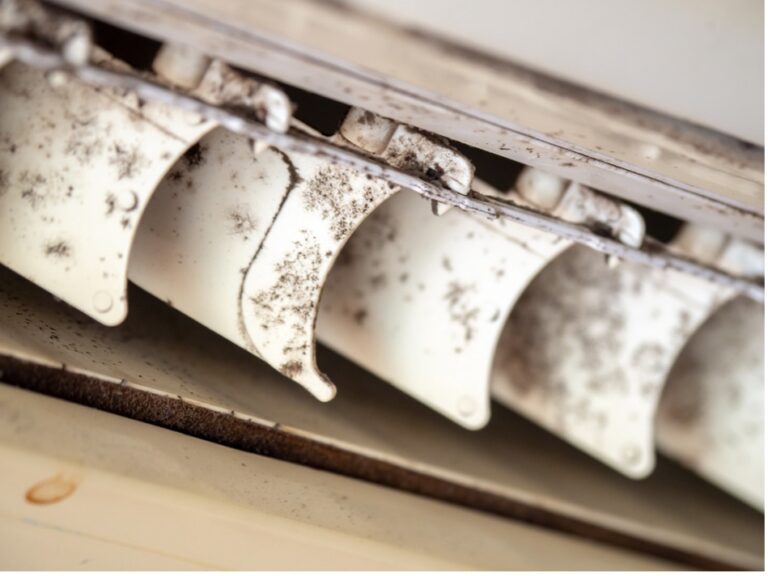
Mold in central air conditioner systems can cause an array of problems. Mold in AC units can impede system efficiency by obstructing airflow and clogging air filters, which in turn reduces the overall effectiveness of the air conditioning system.
Additionally, as mold spores are circulated through vents, they can significantly deteriorate indoor air quality — potentially leading to health issues for residents, particularly those with allergies or respiratory conditions. If you’re worried that there’s mold in your air conditioning system, here are some signs to look out for, why it grows there to begin with, and what to do if you find it.
Common Signs of AC Mold
Visible Mold
The easiest method of confirming the presence of mold in your air conditioner is by visually spotting black mold or other mold types around air vents, within ducts, or on the interior surfaces of the unit. Mold can take the form of irregular black dust, clusters, or streaks, particularly noticeable on filters or where moisture accumulation is common. Regularly inspecting your window air conditioner, central air conditioning system, and or other AC units for these signs will help you catch mold infestations early on.
Mold Odors
Mold in air conditioner systems often produces a distinct musty odor that is detectable when the unit kicks on and the air begins circulating through mold-infested ducts. This smell is a clear sign of mold in AC vents and resembles the earthy scent of damp basements.
The scents of a moldy air conditioner can invade your indoor living spaces and diminish the overall indoor air quality. When these unusual mold odors persist, it suggests a significant mold problem within your air conditioning unit that necessitates a thorough inspection.
Health Problems
When mold spores from an infected HVAC system become airborne, they can severely impact health — particularly for individuals with mold allergies or compromised respiratory systems. Common reactions include allergy symptoms such as sneezing, itchy eyes, and respiratory distress, which might appear or escalate when the air conditioning is in use. It goes without saying, but these issues indicate that mold from your air conditioning system is compromising the air you breathe.
Why Does Mold Grow in Air Conditioners?
Mold growth in HVAC systems typically results from two primary conditions — excess moisture and poor ventilation. In central AC units, mini-split systems, and other HVAC appliances, humidity, and condensation can occur if the system is improperly sized or the climate is inherently humid. Whatever the case may be, these conditions combine with stagnant air and clogged air filters to create a fertile environment for mold to thrive.
What to Do if You Believe There’s Mold in Your AC
If you suspect mold in your air conditioning system, immediate action is necessary to protect your home’s air quality. Begin by inspecting easily accessible parts of your air conditioning, such as air vents and the central AC unit. If you spot mold, contact an HVAC professional to conduct a more comprehensive examination and clean your system. Knowing how to check for mold in an HVAC system often involves specialized tools and techniques that trained experts can provide.
How to Prevent Air Conditioner Mold
Don’t want to deal with mold in your AC unit? There are several steps you can take to prevent mold growth in air conditioning systems. For example, implementing regular maintenance and monitoring indoor humidity levels can eliminate the conditions in which they grow easily.
Additionally, make sure that your air vents and ducts are clear, and routinely replace or clean clogged air filters. It’s also a good idea to use dehumidifiers in humid environments to control moisture effectively. Keeping your central air conditioning and window air conditioner dry and well-ventilated is crucial for preventing mold and maintaining optimal indoor air quality.
Call Air Comfort Technologies Today
If you spot signs of mold in air vents, your air conditioning unit, or other HVAC appliances, don’t hesitate to call Air Comfort Technologies. We offer AC maintenance to lower the chances of mold growth, as well as air conditioning system services to remove any mold and to address other problems.
To schedule a professional service for your home, reach out today.




